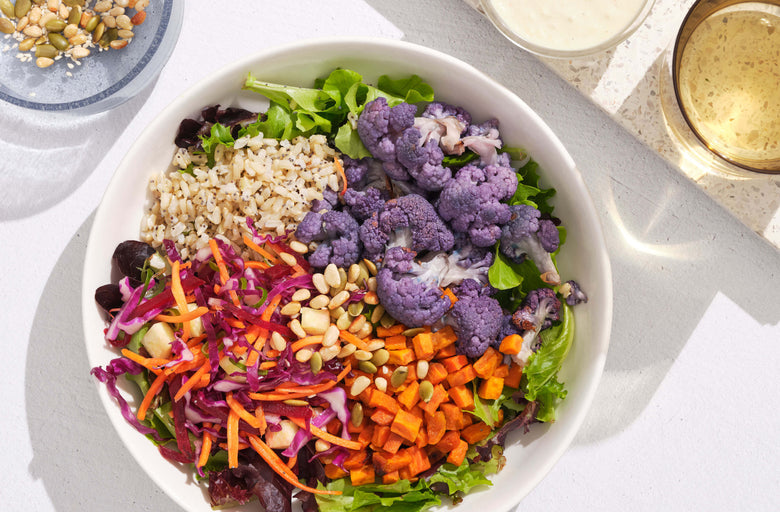Let’s clear something up first: a little bloat post-meal is completely natural. Our powerful GI tract needs the space as it properly nourishes our tissues, cells, and blood. Plus, we love a big, deep diaphragmatic belly breath that allows us to carry oxygen to all of our organ systems, and give our tummies a chance to relax. But when persistent bloat impedes on our confidence or comfort, it could be a sign that digestion isn’t flowing as seamlessly as it could...and in classic Sakara form, we like to get to the root of the issue through food as medicine.
What is Bloat?
Bloat is defined as a protrusion of the abdomen. The causes can be found in a myriad of reasons. And identifying the cause is key, according to Dr. Raphael Kellman, groundbreaking doctor of integrative medicine, author of The Microbiome Diet. “Bloating is caused by air, gas, or stool in the colon and intestines,” he says. “This results in a distended stomach. Bloating can also be the result of fluid or water retention.” Finding the root of the swelling is key to treating it. In addition to a protruding or hard abdomen, bloating symptoms may include abdominal pain and gas that cause flatulence or burping. Fun. But it’s important to notice if these unpleasantries are accompanied by other symptoms. “If you experience fatigue, brain fog, mood swings, and weight gain, this can be a sign of something like an underactive thyroid, ” explains Dr. Kellman. “And that should be attended to by your doctor, as many regular blood tests can miss it.”
Bloat or Normal Digestion?
If your bloat is truly just that, then the swelling will generally ebb and flow as your digestive system goes through the motions of the day. You will most likely have a flat abdomen in the morning when you wake up and find a bit more protrusion after a day of eating. This is totally normal and Dr. Kellman notes that bloat should not be conflated with normal digestion. The fantasy of a totally flat stomach 24-7 is just that—a fantasy. “A completely flat stomach is a delusion,” explains Dr. Kellman. “We are not aiming for flat stomachs here. We want healthy digestion and a thriving microbiome. In some cultures, having a protrusion is a good thing.”
This bit of bloating after eating is a completely normal part of digestion, not something that needs to be fixed. After you eat, your stomach breaks down food into digestible-sized pieces so that it can move through the small intestine. That’s where the majority of digestion takes place. This breakdown of carbohydrates and the fermentation of dietary fiber may produce gas which expands like a balloon, resulting in a slight swell. This bloat passes after a short period of time. If the bloat becomes excessive or does not subside, it may indicate that all is not right in your gut.

Finding Balance
Dr. Kellman believes that exaggerated bloat, like other intrusive conditions such as fatigue, inflammation, joint pain, acne, and depression can be the result of an imbalance in the microbiome. “These trillions of gut bacteria are our best ally to keep our entire systems healthy, including digestion,” he says. “If that bacteria is not healthy, we will have all kinds of problems, including bloat and more serious gastrointestinal problems.” While there are a number of reasons our microbiome can be compromised, diet is normally the first and most overarching culprit. “Stress can be a factor, certainly,” says Dr. Kellman. “Overuse of antibiotics can also be a cause, but diet is the area where we can effect real change. A healthy microbiome is a prerequisite to improving your digestive system and preventing bloat.” His Microbiome Diet is, no surprise, a plant-rich plan filled with gut-friendly foods like jicama, leeks, artichokes, and loads of leafy greens. "Eat foods that are healthy for the microbiome," says Dr. Kellman. “Both prebiotics (like jicama, radishes, and leeks) and probiotics (such as kefir, kimchi, or sauerkraut) keep your body's bacteria happy and healthy.” Building a healthy gut with plants prevents bloating, excessive gas and diarrhea as well as shielding the body from more serious ailments like diverticulosis, gallstones, irritable bowel syndrome, and liver disease. “These problems make everyday life miserable for far too many people who don't realize they could end their suffering by improving their gut health,” says Dr. Kellman.
Hormones and The Gut
Much of the gut microbiome’s power over appetite, cravings, and weight has to do with its influence on the endocrine system. Comprising the pituitary, thyroid, parathyroid, and adrenal glands, the pancreas, and the male and female reproductive organs, this complex network produces 50-odd hormones that rule over everything from sleep to sex. And these chemical messengers play an arguably bigger role in weight than measurements like calories.
Take estrogen, the primary female sex hormone. When it’s present in excess, it causes persistent bloat and weight gain. Or leptin and ghrelin, the hormones that determine satiety and hunger cues in the body: When they are skewed, you can forget about relying on your innate wisdom to decide when to eat and when to stop. And of course, there’s cortisol, the stress hormone. When it spikes, due to factors like excessive sugar and alcohol consumption, lack of certain nutrients, and, yes, too much stress, belly fat often results. Lest that term conjure Facebook ads touting dubious diet pills, consider this: visceral fat in the midsection is particularly risky because it’s linked to type 2 diabetes and heart disease. According to Yale MD, author, and midwife, Dr. Aviva Romm, it’s also a “full-on hormone factory, producing chemicals and hormones that confuse your hunger and fullness signals, [in turn] making you eat more and still not feel full. It’s also pumping out loads of chemicals called cytokines that cause inflammation, depression, and chronic disease.” All the more reason to think beyond aesthetics and consider the holistic effects.
The gut microbiome impacts almost all 50 of these powerful hormones, producing them outright or regulating the amounts in which they are produced and released. So in order to maintain a healthy endocrine system—one that supports optimal weight, whatever that may be for you—it’s important to create a thriving environment in the gut.
Below, find a trio of nutritive tools we keep in our pantry and vanity, purses and pockets—to ensure we don’t struggle with bloating and inflammation on a regular basis.
Horsetail extract, a key plant active in the cacao-rich nutrition powder, is a natural diuretic and has been used traditionally in herbal practices across ancient Greek and Roman lineages. This, along with black pepper piperine, stimulate digestive enzymes in the gut and allows for better nutrient absorption and can support effective bowel movements.
Digestive enzymes are powerful aids when it comes to relieving bloat because their main function is to help with nutrient absorption. Think about it: in the same way that if you scarf down food without properly chewing and stimulating enough gastric juices in the system, digestive enzymes help prevent that unwanted buildup of gas and bloating through properly moving food through the GI tract. These enzymes are even more handy when eating indulgent, heavier meals or going out to eat when portion sizes are larger than life. Because the Complete Probiotic Formula contains a balance of prebiotics, probiotics, and digestive enzymes, your microbiome benefits from multiple angles of having enough symbiotic bacteria to balance immunity, mood, metabolism, and energy.
One culprit of inflammation is dehydration, and improper fluid balance in and around our cells. Part of the blame may stem from an electrolyte and mineral deficiency which is more common than you think, considering the state of our agricultural soil (another important reason to choose organic!) For daily nutritional insurance, we add Beauty Water Drops to our glasses of H2O to ensure we’re adding back critical minerals to our diet, and plumping up our cells with water. For an extra oxygenating punch, we add Detox Water Drops in our evening glasses for a dose of cleansing chlorophyll. This "plant blood" helps to stimulate and oxygenate body tissues, which alleviates stagnation and bloat as well.






